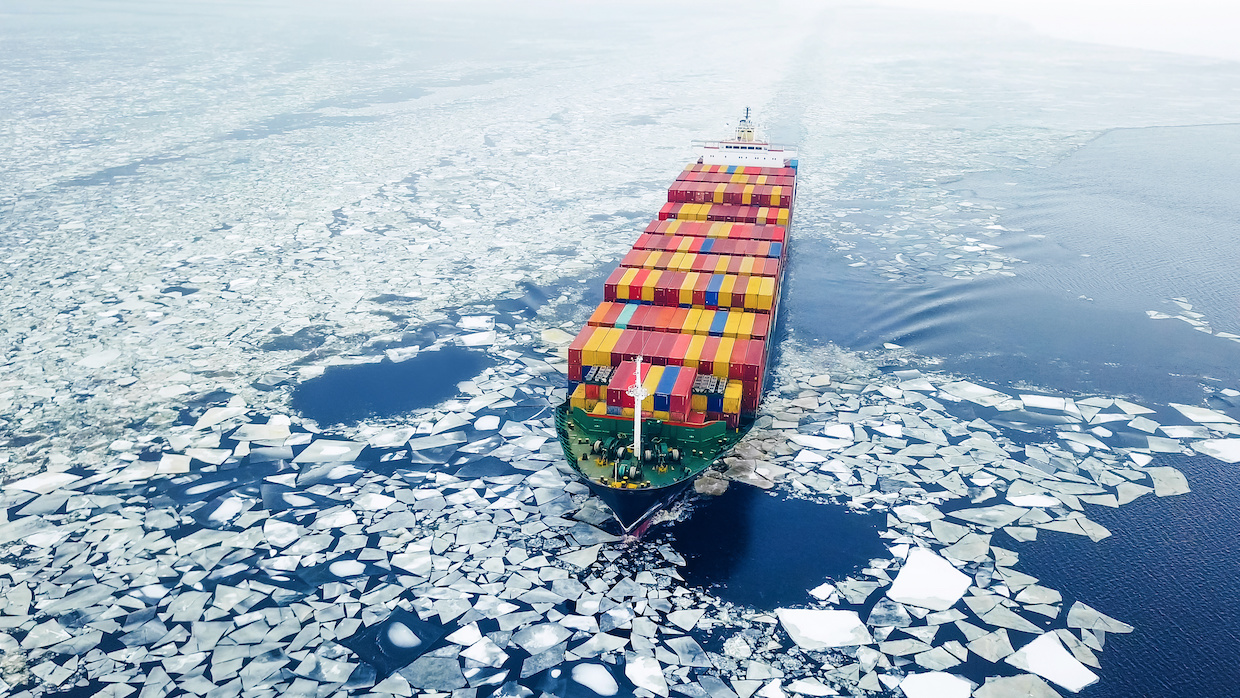Studies estimate that overall shipping activity in the Arctic will increase by more than 50% between 2012 and 2050. It will mean continuing shrinkage of Arctic summer sea ice.
Global warming has led to the thinning of polar ice, to the point where increasing numbers of ships are using the Arctic shipping routes (mainly the Northwest Passage north of Canada and the Northeast Passage north of Russia that includes the Northern Sea Route) which can cut journey times significantly. These routes are generally only open in summer, unless a ship is escorted by an ice breaker. Shipping companies are increasingly investing in vessels that can break through thin ice, but their voyages are generally limited to the summer months. However recently in 2018, the first ships made it through in winter without an ice breaker.
In 2012 T&E published a report Troubled waters: How to protect the Arctic from the growing impact of shipping. Without action, the increase in human activities in the Arctic will cause serious ecological damage. The report recommends that the shipping community recognise the potentially devastating effects of black carbon; that heavy fuel oil is the dirtiest fuel of any transport sector and should be banned; and that non ice-class vessels must be subject to a minimum hull strength to prevent accidents and spills that could have horrendous ecological consequences.
Heavy fuel oil ban
The use of heavy fuel oil (HFO) by vessels operating in the Arctic poses a major risk to the marine environment as, if spilled, HFO is an extremely toxic and viscous marine fuel that breaks down slowly, particularly in colder regions like the Arctic. In the event of a HFO spill, lack of infrastructure, severe weather conditions and navigational hazards such as sea ice, would render spill response efforts nearly impossible. If an HFO spill were to occur in ice-covered waters, oil could be trapped in ice, causing it to persist even longer, and enabling its transmission over long distances.
Aside from the devastating acute impacts an HFO spill would have on sensitive Arctic ecosystems, studies on the long-term impacts of an Arctic spill demonstrate oil can remain within the affected area for more than a decade, impacting growth and reproductive rates of various species.
Many indigenous residents of the Arctic region depend on marine resources as a primary food source, use marine resources as a source of clothing and equipment and as material for handicrafts, and to support their limited commercial fishing, hunting, and ecotourism activities. Analysis has shown that it would cost passengers just the price of a glass of wine (less than €7) a day if cruise ships would stop burning highly polluting heavy fuel oil (HFO) when operating in the fragile Arctic environment.
Transport & Environment is a member of the Clean Arctic Alliance, a group of environmental NGOs committed to prohibiting the use of HFO as marine fuel in the Arctic.
At this time, phasing out the use of HFO as marine fuel is the most effective mitigation strategy and is currently the priority for the CAA. Accordingly, the CAA urges the International Maritime Organisation, the appropriate international body to regulate the use and carriage of HFO, to adopt a legally binding instrument to phase out the use of HFO as marine fuel in Arctic waters by 2020.
Cruise ships in the Arctic
Arctic cruising is increasing fast with Svlabard, Norway experiencing 20% year-on-year growth in cruise tourism. Studies show that 86% of cruise ships visiting the arctic are burning HFO, a toxic sticky substance that if spilled would devastate the Arctic environment. The HFO free Arctic campaign, of which Transport & Environment is a member, is calling for ships to stop using HFO when entering and transiting Arctic waters. A case study conducted on 2017 cruise ship voyage data shows that a switch to distillate for cruise ships in Arctic waters would amount to less than an extra €7 per day per passenger. Read more here.
